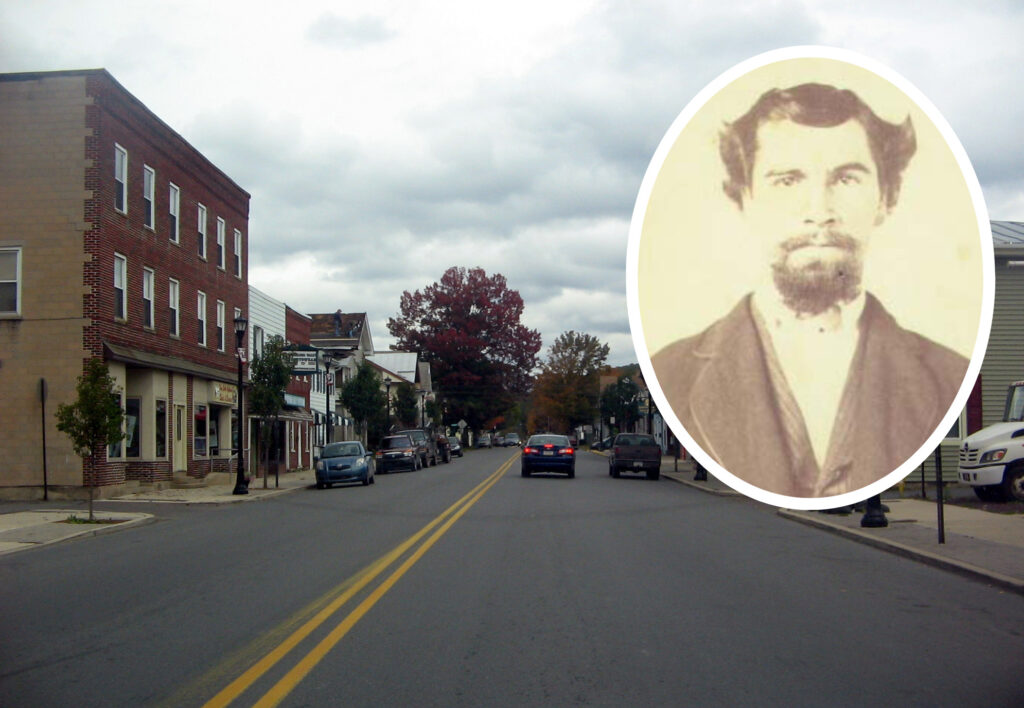
HUGHESVILLE – In the southeastern position of Lycoming County is the borough of Hughesville, which was incorporated in 1852. However, the borough’s history goes decades before that with the purchase of the land in 1816 from a farmer named John Heap. He sold the property to Jeptha Hughes.
“(Jeptha Hughes) soon…laid out a town. It first took the name ‘Hughesburg’,” a writer said in the “History of Lycoming County” that was edited by John Megginness.
Within four years, Hughes had sold his land to Daniel Harrold. “The town grew slowly for a long time,” that same writer said. A gristmill was built in 1819 and in 1828 the first doctor moved to the area.
However, Jeptha Hughes would move on from his East Lycoming residence. According to Find-aGrave, Hughes is buried in Evergreen Cemetery in Tioga, which is an hour up Route 15 from the Williamsport/Lycoming area.
In a post written by genealogist Cynthia Smith, who says she is a descendant on Hughes on a blog entitled “Who’s Your Grammie?,” she explained Hughes’s story “is that of the ancestor every kid who ever came to a Hughes Reunion in Tioga knew. The Hughes family is proud to be descended from Jeptha.”
The Hughes family
With Hughes being part of Tioga County, more information is found in “History of Tioga County, Pennsylvania” Volume II.
“Jeptha Hughes was born in Danville, Pennsylvania (in 1791) where his father, Thomas Hughes, settled before the Revolution,” the sketch said.
Thomas Hughes was from a family of Welsh Quakers. Smith said on her blog that it was speculated that Thomas Hughes was born in Berks County around 1740.
“As a member of the group of pioneers who settled in the Catawissa area, it is known that Thomas was a Welsh Quaker. Therefore it is unlikely that he would have fought in the Revolutionary War and no evidence has been found to show that he did serve in the (Revolutionary War),” Smith said.
Smith said Thomas Hughes met and married Mary Stevens in 1773. During their marriage, they had eight children.
While in Danville, a 1955 article from the Elmira (NY) Star Gazette claimed on Aug. 11, 1955, that Thomas Hughes built a Presbyterian Church in town.
Eventually, they settled in Northumberland in the late 1770s. It is believed they were involved with the Big Runaway when local natives became violent to the local settlers.
However, tensions were able to come to a peace and the Hughes family settled in Danville. It was here in 1791, that Jeptha was born.
Smith said that Hughes was still very young when Thomas, his father, died on Sept. 16, 1807.
“It would appear that Thomas’s death was unexpected, since he did not leave a will,” Smith said.
‘Man of vision’
By 1816, Hughes had enough money to purchase the land that would become Hughesville (aka Hughesburg).
“Jeptha was a man of vision,” said Smith.
At the same time this happened, he met Elizabeth Hill, of Lock Haven, and married her. They had eight children, but by 1820 they sold their interest and moved up to Tioga County.
Upon arriving, the Hughes family settled on Beecher’s Island, which was named for two brothers who pioneered in Tioga County.
Smith quotes another Hughes family member, Daisy Miller Hughes, who said, “Jeptha set out on foot with his father’s brother George (who may have been his cousin) to seek a new territory.”
On Beecher’s Island, near the Blossburg Mountain, coal was available near there. The Hughes men “found shelter with a family who told them it was a dwelling place for Indians who called the river Cowanesque, and at the upper end a settlement called Nelson.”
Since Hughes “liked what he saw,” he sent for his family. Proving Smith’s “man of vision comment,” the Erie Railroad would build a route from the coal mines of Blossburg in 1863. Later the area would be known as the Tioga Junction.
In 1838, Hughes and family then moved to another Tioga County town named Mitchell’s Creek, which runs parallel to Route 15.
Hughes would remain there for the rest of his life. He died in 1866 at the age of 75 years old. His wife Elizabeth would live until 1881 and both were buried in the previously mentioned Evergreen Cemetery in Tioga.
The Hughes legacy
However, Hughes’s name would still pop up in the news for decades to come.
His oldest son, Frederick, who was described as a “prosperous farmer,” would die in 1906 at the age of 86, according to the Republican News Item (Laport). The May 10th obituary of him said he “was probably the first child born in the town (Hughesville).”
“He was born in a log house standing on the same lot where now the bank building is located,” said the obituary writer.
His other descendants would regularly appear in the newspaper, especially ones named for him.
“For generations Hughes boys have carried his name,” Smith said.
In a Sept. 19, 1942 article in the “The Evening News” (Harrisburg) that Sgt. Jeptha Hughes, of Tioga, Pennsylvania was part of the crew of a Flying Fortress Boeing B-17 bomber that fought with a Japanese Kawanishi Flying Boat in the Solomon Islands.
On a humorous note, according to the Williamsport Sun-Gazette on July 24, 1952, a parade was held in honor of Hughesville’s Centennial. An award was given to a parade participant for the “best rendition of Jeptha Hughes” – meaning someone dressed as him.
During a 1955 reunion of the Hughes family, the Elmira newspaper said, “The sons, grandsons, and great grandsons and daughters of Jeptha Hughes make up the large segment of the Hughes family in this section today.”
Finally, in 1961, Hughesville resident Harry Swartz died at the age 80.
“He was a direct descendant on the maternal side of Jeptha Hughes, the founder of Hughesville,” said his obituary in the Oct. 30th, 1961 edition of the Danville News.
On her blog, Smith explained her interest in Hughes.
“Jeptha and Elizabeth Hill Hughes were my 3rd great grandparents. Their son Frederick…married Harriet Van Wey and had a son named Simeon who married Fannie Westlake. Their son Richard was my grandfather,” Smith said.
Thanks to Hughes’s foresight and dedication to settle the land and make things a better place for his family and children, Smith’s grandfather was “so proud to point out to me – as we stood on a hill top – and say, “As far as you can see” was Hughes land.”





Thanks Don. What a nice article about the Hughes family of Tioga. I enjoyed all the additional research you conducted to complete the article. Best regards, Cynthia Hughes Smith.